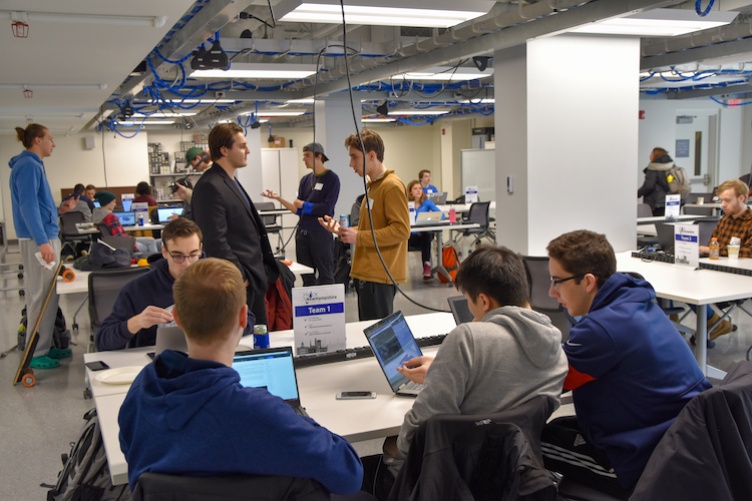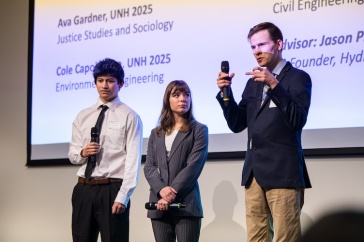
Even though she’s a computer science major, Mallorie Biron ’20 had never participated in a 24-hour hackathon. But when she signed on for this year’s (the third) Hack NH, she found out that majors don’t matter; the hackathon is open to UNH students from all colleges.
Hack NH is hosted by UNH’s InterOperability Lab (IOL) and presented by the Peter T. Paul Entrepreneurship Center, commonly referred to as the ECenter. The IOL is a world-renowned test facility for data and networking communications products that employs more than 100 UNH students.
A total of nine teams participated. A panel of judges consisting of industry members, faculty and staff rated the hackers in the categories of best working product, best business plan and best creative impact. Prize amounts totaled $1,500.
“I had participated in a weeklong hackathon at the lab twice before, but a week is a lot longer than 24 hours,” Biron says. “I got to create something with my friends, and we were able to learn new things from each other. It is also a great experience to work on a project outside of the classroom.”
During the 24-hour event, held Feb. 22-23, students worked together to solve problems through innovative solutions. In a nod to the New Hampshire primary, this year’s challenge asked students to find ways to help the state become safer or more sustainable while solidifying interest among young voters and gauge creative solutions to improve voting practices. Issues highlighted included the need to solve problems such as low voter turnout, lack of informed voters and voter fraud. Solutions ranged from online voting systems, facial recognition software and a rideshare app.
A total of nine teams participated. A panel of judges consisting of industry members, faculty and staff rated the hackers in the categories of best working product, best business plan and best creative impact. Prize amounts totaled $1,500.
New Hampshire’s Liberty Mutual, Bottomline Technologies and Arista Networks hosted the event for the second year in a row. More than 30 undergraduate students from freshmen to seniors representing the College of Engineering and Physical Science, Paul College and the College of Health and Human Services participated.
"This was my third year doing the hackathon,” says Spencer Couture, ‘20, also a computer science major. “It's a great way to sit down and really explore concepts and frameworks that you've always been wanting to try but have never had the chance. The environment is always very supportive and open, so you don't feel any external pressure to complete a project – other than the pressure you put on yourself. It's a lot of fun, and I would recommend it to anyone who has a weekend to spare."
Participating students included:
Sean Kohlbrenner, Taylor Roy: Ranked Choice NH, a web app simulation to educate voters on the candidates
Caleb Peffer, William Tu, Nick Camara, Benjamin Whitehead: TriVote, a mobile game that encourages and educates voters on issues and candidates
Hassan Al-Jewad, Naomi Schneider, Shania Robinson, Jacob Uren: E-Lection, an app designed to increase voting for people ‘too busy to vote’ by using an online system for registered voters
Matthew DiBiase, Heidi Simoneau: FacingFraud, facial recognition software to eliminate voter fraud for absentee ballots and false voter registration
Nick Kahn, Cornelis Plomp, Sean Smith, Brendan Crowe: Iowa Caucus Software Team, a low- cost software package designed to give ‘smaller’ candidates an idea of how they are favored or recognized in various communities.
Jessica Nelson, TJ Evarts: TruCount, a free app designed to eliminate voter fraud by using an in-person check-in system which gives voters a QR code to use at the polls.
Spencer Couture, Tommy Cranmer, Daniel Kirichok, Rachel Martinez: Tommy 3.0, an online voter registration website to help streamline the registration process for new voters.
Mallorie Biron, Connor Lennox: BallotBus, an idea designed to help with low voter turnout by using a rideshare app, integrated with Google Maps and created using Python, to get people to the polls if they don’t have a ride.
Eric Ciarla, Elijah Johnson, Daniel Mattson, Eric Tseng: Team xid, a web extension created using the fakebox API, to check websites and provide a ‘trust factor’ rating to ensure the news you’re reading is real or substantial.
-
Written By:
Mara Johnson | InterOperability Laboratory
-
Compiled By:
Jody Record ’95 | Communications and Public Affairs | jody.record@unh.edu



















































